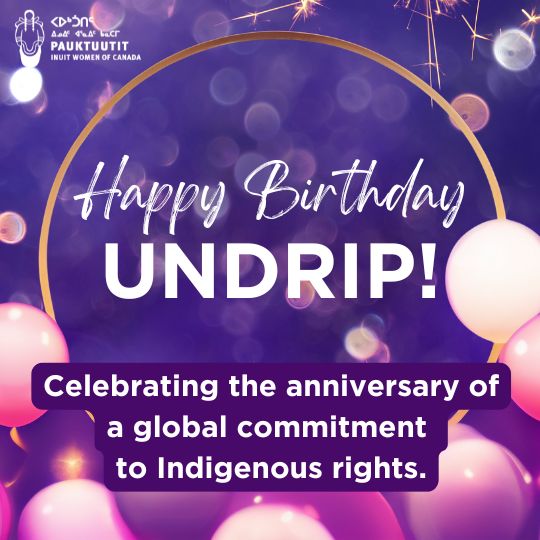
Today, we celebrate the anniversary of the United Nations Declaration on the Rights of Indigenous Peoples (UNDRIP)—a historic milestone for Inuit and Indigenous Peoples around the world. UNDRIP is not just a document; it represents a turning point in the recognition of our rights and the drive for real change for our communities.
The journey toward UNDRIP began back in 1983, sparked by the Martinez Cobo Study, which exposed a harsh truth: Indigenous Peoples had been left out of every United Nations text. This realization led the UN to create working groups and committees to better understand Indigenous Peoples’ experiences.
For Inuit, represented by the Inuit Circumpolar Council (ICC) and others, it was an opportunity to stand side by side with fellow Indigenous groups, fighting to ensure our voices were heard. By 1994, the first draft of the Declaration on the Rights of Indigenous Peoples was approved by the UN Working Group on Indigenous Populations. This draft was more than words on a page—it was built on years of Indigenous activism, resistance, and the unwavering belief that we deserved to be seen and heard. However, the fight wasn’t over. It took twelve more years of relentless advocacy before the Declaration made its way from working groups through the Human Rights Commission and to the General Assembly.
Canada, the United States, New Zealand, and Australia, all active settler colonies, refused to endorse UNDRIP because they believed that acknowledging Indigenous rights would undermine their authority. Yet, leaders like Rebecca Kudloo, past president of Pauktuutit, were unyielding, pushing for change and demanding recognition.
Fast-forward to 2021, when we witnessed a historic shift in Canada. The United Nations Declaration on the Rights of Indigenous Peoples Act (UNDA) became law, cementing Indigenous Peoples’ rights into the fabric of Canadian legislation.
This law ensures that no future legislation can undermine these rights, and is a significant step toward decolonization and combating systemic racism faced by Indigenous Peoples. Making Indigenous rights part of the law helps break down the unfair systems that have held our communities back for generations.
Our role as Inuit in this global movement is far from over. Aluki Kotierk, President of Nunavut Tunngavik Inc. (NTI), was recently elected Vice-Chair of the United Nations Permanent Forum on Indigenous Issues (UNPFII)—the first Inuk from Canada to hold this role. Her leadership follows a legacy of Inuit trailblazers like Aqqaluk Lynge and Dalee Sambo Dorough, and it reminds us that Inuit voices are continuing to shape global conversations on Indigenous rights.
Here at Pauktuutit Inuit Women of Canada, we are deeply engaged in this work, collaborating with the Department of Justice to ensure that Inuit women, girls, and gender-diverse Inuit are fully supported by UNDRIP. As the Canadian government works to integrate the Declaration into its laws, we expect to be at the table—ensuring our perspectives and needs are front and center.
Inuit have fought tirelessly to have our rights recognized. Today, as we celebrate how far we’ve come, we honour the strength and leadership of Inuit women who have brought us here and pledge to keep pushing forward toward a future where Indigenous self-determination is a reality.